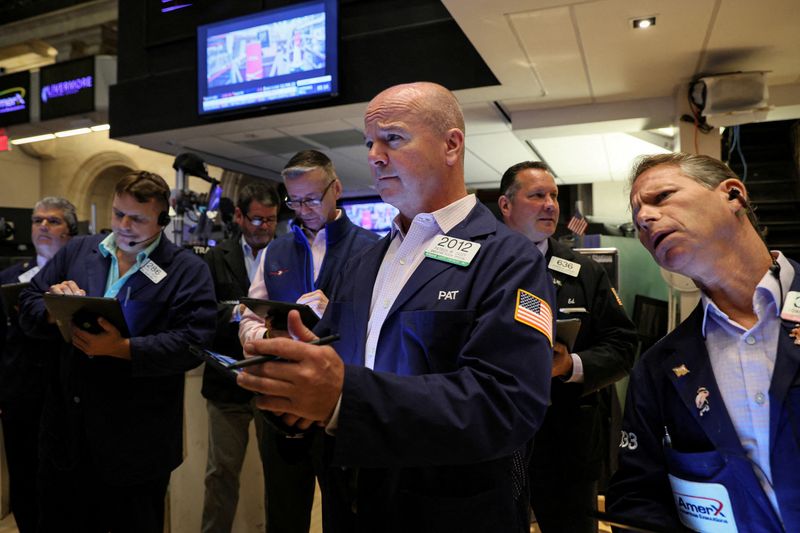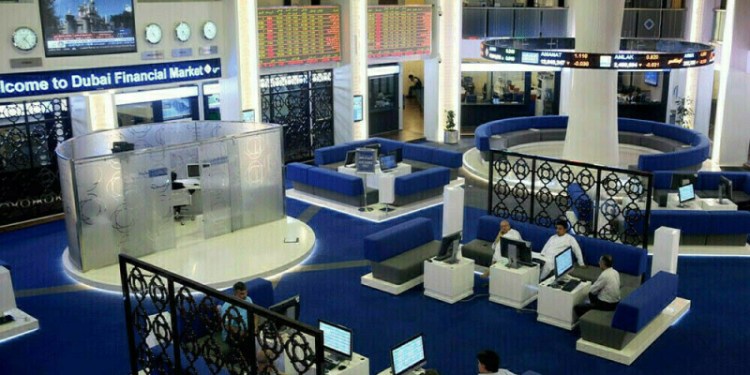
© Reuters. FILE PHOTO: Traders work on the floor of the New York Stock Exchange (NYSE) in New York City, U.S., August 22, 2022. REUTERS/Brendan McDermid
By Chuck Mikolajczak
NEW YORK (Reuters) – U.S. stocks were lower for a fourth straight session on Wednesday and were poised for their weakest August performance in seven years as worries about aggressive interest rate hikes from the Federal Reserve persist.
Adding to pressure were declines in the technology sector, and more specifically chipmakers, after soft forecasts from Seagate, down 3.42%, and HP Inc (NYSE:HPQ), which slumped 7.22%.
The three main indexes were on track for their biggest monthly percentage decline in August since 2015. After hitting a four-month high in mid-August, the S&P 500 has stumbled in recent weeks, dropping more than 7% through Tuesday’s close and falling through several closely watched technical support levels.
Selling pressure accelerated after Fed Chair Jerome Powell’s hawkish remarks on Friday about keeping monetary policy tight “for some time” dashed hopes of more modest interet rate hikes, with the benchmark index down more than 5% over the past four trading sessions.
“It’s been a rough go since Chairman Powell’s speech at Jackson Hole, we had that huge down day and there was some maybe hope that maybe the market would stabilize a bit, but just every little bounce has been met with selling pressure,” said Yung-Yu Ma, chief investment strategist at BMO Wealth Management in Chicago.
“The market is kind of shifting back to the macro picture, which is now sort of recalibrated to the expectation of more Fed hawkishness and the idea that the economy could slow more than anticipated, even the question about corporate profits is back on the table.”
Cleveland Federal Reserve Bank President Loretta Mester said on Wednesday the central bank will need to boost interest rates somewhat above 4% by early next year and hold them there in order to bring inflation back down to the Fed’s goal, and that the risks of recession over the next year or two have moved up.
The Dow Jones Industrial Average fell 181.55 points, or 0.57%, to 31,609.32; the S&P 500 lost 17.89 points, or 0.45%, to 3,968.27; and the Nasdaq Composite dropped 31.04 points, or 0.26%, to 11,852.09.
Data earlier in the day showed ADP private payrolls increased by 132,000 jobs in August, falling short of economists’ forecast of job growth of 288,000, according to a Reuters poll. However, the report was suspended for June and July as the methodology was overhauled following a poor track record of being in sync with the government’s payrolls report.
The jobs data from the Labor Department is due on Friday and is expected to show nonfarm payrolls rose by 300,000 last month after recording a 528,000 increase in July. Another strong report is likely to further cement expectations the Fed will continue with outsized rate hikes after three straight increases of 75 basis points.
The Philadelphia SE semiconductor index lost 1.37% after Seagate slashed its first-quarter earnings expectations, citing macroeconomic concerns that are forcing cloud companies and PC makers to cut inventory levels.
In addition, HP Inc forecast downbeat quarterly and full-year profit on slowing PC sales.
Snap Inc (NYSE:SNAP) rose 8.44% after saying it will cut 20% of staff, restructure its advertising sales unit and shut down some projects to focus on improving sales and number of Snapchat users.
Chewy (NYSE:CHWY) Inc slid 8.50% after the online pet supplies retailer cut its full-year 2022 sales outlook.
Bed Bath & Beyond Inc (NASDAQ:BBBY) plunged 21.87% after saying it would close 150 stores, cut jobs and overhaul its merchandising strategy in an attempt to turn around its money-losing business.
Declining issues outnumbered advancing ones on the NYSE by a 1.93-to-1 ratio; on Nasdaq, a 1.27-to-1 ratio favored decliners.
The S&P 500 posted no new 52-week highs and 11 new lows; the Nasdaq Composite recorded 12 new highs and 161 new lows.
Source: Investing.com





























